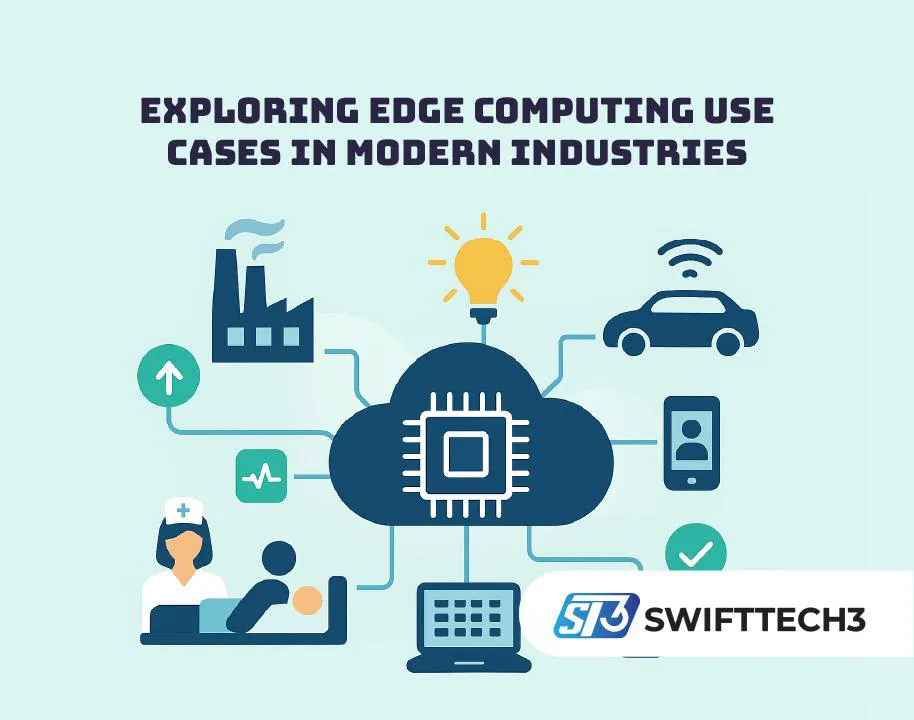Tech world is changing so fast that sometimes it feels hard to even keep up. Cloud was the big hero a few years back, but now, edge computing is taking spotlight. Many experts call it the next big wave after cloud and AI, but what’s it actually? And more importantly, why we should care?
Simply put, edge computing is when data processing happen closer to the source, instead of sending everything back and forth to a far away datacenter. So when we talk about edge computing use cases, we mean all the different scenarios where this tech is actually working in real life. And trust me, there’s plenty.
What is Edge Computing in Simple Words
You know how cloud works right? You upload things, data gets processed somewhere far, and results comes back. Edge computing kinda flips that around. Instead of waiting for cloud, data is handled right on the spot. Like, if a self-driving car has to brake, it can’t wait for a server sitting 1000 miles away to say “stop.” It must decide instantly.
This “process localy” approach makes system faster, less dependent on internet, and even saves money in long run. But yes, it’s not all perfect, some challenges are there, like security updates, device failures, etc.
Popular Edge Computing Use Cases
1. Smart Cities and Public Safety
One of the biggest use is in smart cities. Traffic lights that adjust automatically, cameras that detect unusual behavior, waste bins sending signals when full. Instead of wasting time sending signals to a main cloud, they act directly. This reduce congestion, saves energy, and honestly just makes cities feel more liveable.
2. Healthcare and Wearables
Hospitals are embracing edge because patient monitoring requires real time data. Imagine a heart patient wearing a smart device—waiting even few seconds can mean life or death. With edge, alerts are generated instantly, data stored safely, and doctors notified quickly. And privacy is higher because data not always leaving the device. According to National Institute of Standards and Technology, edge is seen as critical for secure medical systems.
3. Retail and Customer Shopping
Retail chains use edge for instant fraud detection at cash counters, inventory checks, and personalized offers on smart displays. Even if internet goes down, the edge servers inside the store keep everything running smooth. This means customers never stuck waiting in long lines.
4. Self-Driving Cars and Transport
Maybe the most well known edge computing use case. Cars filled with sensors can’t rely only on cloud. Processing must happen on-board. Edge makes sure braking, lane changing, or collision avoidance happens without delay. Same goes for drones delivering packages—they make decisions while flying, not after sending data miles away.
5. Industrial IoT and Manufacturing
Factories are a goldmine for edge adoption. Machines with built-in sensors predict failures before breakdown. This predictive maintenance saves cost, reduces downtime and improves worker safety. Companies investing here often see huge ROI within couple of years.
6. Agriculture and Farming
Yes, even farms are getting smart. Edge powered drones track soil moisture, plant health, and send real time alerts to farmers. Instead of checking every acre manualy, farmers get instant insights, reducing wastage and boosting productivity.
Why Businesses Moving to Edge
There’s several reasons why edge is hot topic now:
- Low Latency: Decisions made instantly, critical for healthcare, cars, and finance.
- Reliability: Works even if main internet is down.
- Security: Sensitive info can stay local, lowering risk of leaks.
- Cost Efficiency: Less bandwidth consumed, meaning companies save money.
But yes, adoption also comes with challenges. Maintaining 100s or 1000s of edge devices is complex, security patches must be pushed often, and initial hardware cost isn’t cheap.
Edge in Different Industries
- Finance: Faster fraud detection at ATMs, instant approvals in branch.
- Telecom: 5G networks can’t function without edge nodes near users.
- Energy: Smart grids balance loads with edge devices in seconds.
- Education: Remote classrooms using edge caching to deliver video even on weak internet.
Edge Computing vs Cloud Computing
Now, does this mean cloud is dead? Nope. Think of it like teamwork. Edge handles the fast, urgent stuff, while cloud takes care of storage, analytics, and heavy computing tasks. Companies combining both are the ones actually winning.
Example: A factory machine may use edge to detect issue instantly, but send data later to cloud for monthly analytics. So both are crucial parts of digital strategy.
Pros and Cons
Pros:
- Faster response time
- Data privacy stronger
- Offline functionality possible
- Enhanced user satisfaction
Cons:
- High upfront device cost
- Difficult to manage at scale
- Needs skilled staff for updates
- Risk of cyber attack if patches missed
Tips for Companies Thinking About Edge
- Start small—pick one use case like predictive maintenance or local monitoring.
- Don’t try to replace cloud, combine both smartly.
- Focus on security from start, not later.
- Train IT teams for distributed device management.
FAQs

Not at all. Even a small retail shop can use local servers for POS systems or customer personalization.
Many AI models are now deployed at edge so decisions are made instantly without needing cloud round trips.
No, but they work together. 5G provides ultra-fast network, edge ensures processing happens closer.
Real-World Example Case
Take the example of autonomous cars. Tesla and other companies equip cars with multiple sensors, radars, and cameras. These produce terabytes of data daily. If all that was sent to cloud, it’d be impossible to drive safe. By using edge computing onboard, cars react instantly while cloud is used for bigger data analysis later.
Similarly, in healthcare, hospitals using edge-enabled monitoring systems already seen reduction in emergency response times. Faster detection of patient issue, faster medical action.
Conclusion
Edge computing is not just buzz, it’s already here and changing the way industries operate. From smart cities to retail, healthcare to farms, edge computing use cases are proving that this model delivers faster response, better safety, and long-term cost savings.
If your organization still rely only on cloud, maybe it’s time to experiment with edge too. It’s not about replacing one with other, but building a hybrid model that fits your needs. The companies that adapt earlier usually gets the competitive advantage, while others keep playing catch up.
So yeah, edge computing is not just some tech trend—it’s literally shaping how future services and products will be delivered to people.


